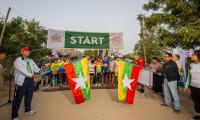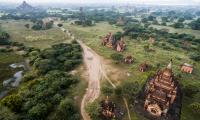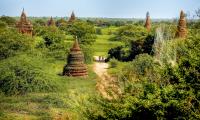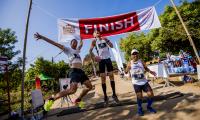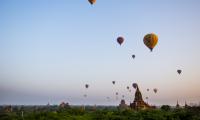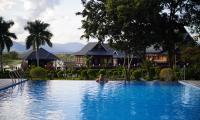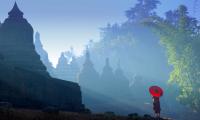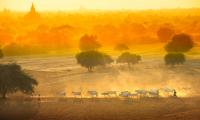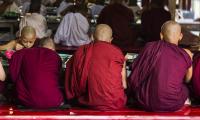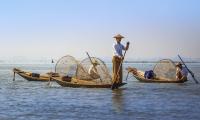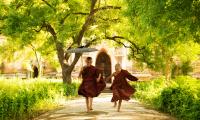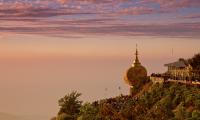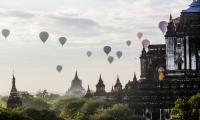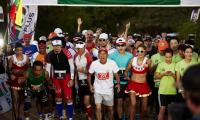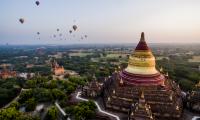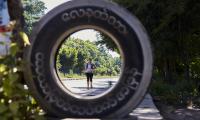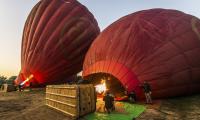Destination Guide
If you do not find the answer you're seeking, feel free to contact us with your question.
LanguageBurmese |
Capital CityNaypyidaw |
Inhabitants56,8 Million |
ReligionTheravada Buddhism |
CurrencyKyat (MMK or K) |
Area676.577 sq. km. |
Special Dietary Requirements
We understand that allergies and special diets are a common concern among our guests. We do our very best to accommodate any diet for medical, allergy or religious needs; however, we cannot guarantee that all dining establishments can fulfill special requests. As a result, we encourage our guests to take all necessary precautions during their travel.
Guests with special dietary requirements should inform their server upon arriving at the location. To facilitate this, we strongly recommend bringing a description of your dietary needs which has been translated into the local language. When present, your Albatros tour leader can also help inform local eateries of any special requests.
As a largely Buddhist country, vegetarians should find it slightly easier to get along in Myanmar than in some other countries. That said, it should be noted that Myanmar Buddhists do eat fish and meat most of the time, and even what the Burmese people consider a "lifeless" dish may have a meat- or fish-based stock, so be diligent.
If you require a special diet during your travel, please inform us.
Please note: This information must be received no later than 45 days before your tour begins.
Language
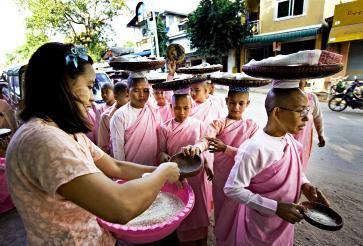
Burmese, a Sino-Tibetan language, is the official language in Myanmar, and it is spoken by roughly 2/3 of the population. The ethnic minorities generally have either their own linguistically separate languages or a variant with Sino-Tibetan roots as well.
Written Burmese is a non-Latin alphabet, so foreigners may find it difficult to read signs. However, in popular tourist destinations, much of the signage is in English. As a former British colony, Myanmar also has a strong history of English speaking and it is still taught in schools and monasteries today.
Finally, the Burmese people are exceptionally friendly. If, somewhere, no English is spoken, smiles and gestures will get you far.
Electricity
The standard voltage in Myanmar is 230V while the frequency is 50Hz. If you are bringing a laptop or similar portable device with you, be sure to check the labeling on the power pack. It should describe the amount of voltage your device can handle, and if a voltage converter is required.
The electrical sockets in Myanmar are mostly one of two European standard outlet types (Type C or F). However, they also sometimes utilize types D, I, G, and A. We recommend that you bring a Type G (standard British) travel adaptor along, and, if your plugs are not European standard, you should bring a plug that fits Type C/F.
Telephone & Internet
The international calling code in Burma is +95. It is expensive to roam in the country, but you should check with your phone provider for specific rates and availability.
The internet throughout the country is very slow, and still regulated by the regime. Hotels will generally have access available, but it will not be a fast or reliable connection and the use of some sites may be restricted.
Food & Water
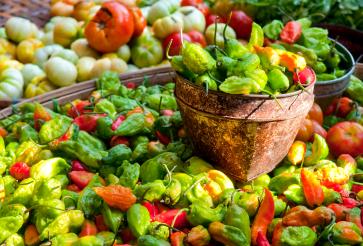
The tap water in Myanmar is not safe to drink. Most hotels provide a kettle for boiling water, and bottled water is provided along the marathon route.
For daily drinking purposes, it is advisable to buy bottled water. Fresh vegetables and fruit from which you eat the skin should also be avoided.
For information on Myanmar’s cuisine, please see our Destination Guide.
Myanmar or Burma?
The issue of the country’s name is a tricky one. The term Burma is derived from the name of the largest ethnic group in the country, the Bamar people – they are referred to as Bama/Burmans in spoken language and Mranma/Myanma in the written language. Burma was what the English called the country when it was a colony, and Burma was chosen as the official name of the country upon their independence.
In 1989, the military junta changed the name of the country and some cities (such as Rangoon to Yangon) with the aim of reconciling English place names with Burmese place names and pronunciation. Since Myanma is the official name in the Burmese language, and because it is arguably more inclusive of minority populations, Myanmar was chosen as the name. However, out of protest against the military junta, Aung San Suu Kyi , the National League for Democracy, and allies sympathetic to their cause, like the US and UK, refused to acknowledge the name change so as to avoid lending legitimacy to the regime. However, in recent years, Suu Kyi’s stance toward the name Myanmar has softened, and she uses it herself to refer to the country.
In short, there is no universally accepted name. Since Myanmar is the official written name of the country, we use it here. However, in spoken language, both Myanmar and Burma are acceptable terms and are often used interchangeably.
Clothing & Customs
There are no strict requirements for how to dress in Myanmar. While it is hot, it should be remembered that it is still a conservative country. Shorts above the knee are unusual for both women and men, and to enter holy sites, knees and shoulders need to be covered. The race is run in an area that is used to tourists, which means runners can wear whatever they want to on race day. However, for daily use traveling through the country, it would be wise to bring light, loose clothing that covers the skin. Additionally, shoes must be removed before entering temples or holy sites – sandals are thus a sensible choice, as some days you may be taking your shoes off and on several times.
In addition to removing shoes at temples, be mindful not to point the soles of your feet toward a Buddha statue or another person, as the soles of the feet are considered unclean. Do not touch or climb on the Buddha statues, and please be respectful of any ‘no photos’ signs. While in general it is okay to photograph a Buddha statue, visitors should not take selfies with it as it is a sign of disrespect to pose in front of it and turn your back to the statue.
And finally, guests should note that while the areas we’ll be visiting are perfectly safe, the political situation in Myanmar is still delicate. The military continues to have a strong presence in the country, and freedom of speech is still heavily suppressed. As such, kindly refrain from asking locals question that might provoke controversial responses, unless they explicitly indicate that they are willing to discuss such topics.
What to Pack?
As mentioned, Myanmar is a hot country. Light-colored, loose clothing is a good idea, as well as a pair of sandals to tour the holy sites with. A sweater might also be warranted in the higher areas like Inle Lake, which can get chilly around November. This also means you should remember sunglasses and sunscreen. The electricity in Myanmar can occasionally be unreliable, so guests might want to bring a flashlight/headlight and extra batteries. It is also a good idea to either bring or buy insect repellant. While mosquitos in November are less of a problem than at other times of the year, some may still be present.
Toilet Facilities
Squatting or sitting? In the cities and the places where tourists frequent, western-style toilets are the norm. All the hotels we use have western-style toilets, and they can also be found at some restaurants. That said, squat toilets are as popular here as they are elsewhere in Asia, so visitors should always be prepared to encounter one, especially if you visit more rural villages.
It is also important to note that toilet paper is rarely found in public restrooms. Carry your own supplies. When using any toilet in Myanmar (Western-style or squat), do not flush the paper! To avoid any potentially embarrassing or overflowing toilet situations, be sure to dispose of toilet paper in the provided trash bin.
Currency
The currency in Myanmar is the Kyat (MMK or K for short). In Myanmar, cash is king – while more and more places accept credit card (Visa and Mastercard), some shops, street vendors, and train stations do not accept cards. The amount of ATMs is also increasing, especially in larger cities like Yangon, Mandalay, and Bagan, but the machines can be unreliable. Thus, it is a good idea to bring cash with you on your trip to exchange in-country. US dollars are the easiest to exchange, and some places will change euros as well. Other currencies are rarely accepted. If you bring USD, please make sure that you bring newer bills free of discoloration, tears, or creases. Bills damaged even slightly will typically result in lower exchange rates, or they may be rejected outright. Also be sure to count your kyat, which is often provided in ready-made stacks of bills.
Tipping Guidelines
As always, tipping is not mandatory. Tipping is generally not a part of the culture in Myanmar, but the recent influx of tourists means that more people in the tourism industry expect tips.
Larger restaurants may automatically include a service charge, so check on your bill to make sure you don't tip twice. If it doesn't include a service charge, 5-10% is always appreciated.
In general, you should not feel obligated to tip, but if you have a particularly good tour guide or driver, a small tip is much appreciated.
Medical Facilities
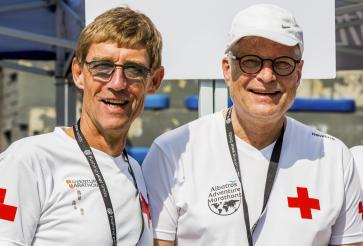
Please note that participants are responsible for their own travel insurance.
Medical assistance during the marathon event
A team of English-speaking Danish doctors will be present during the pasta dinner and the race. The medical team is ready in case of injury or severe exhaustion.
Albatros Adventure Marathons™ will ensure that an English-speaking doctor/medical team is available for participants of our marathon events. If any treatment is unable to be carried out by the doctor and it is necessary to refer a participant to local medical facilities, the doctor/medical team and travel agency will not be held liable for any treatment carried out by staff from local medical facilities.
Transport
Please note that buses in Myanmar have a different standard than those that Western customers may be familiar with. Naturally, we choose the best option available – with air conditioning, if possible. That said, it is not always possible to get air conditioning, and the rough conditions of the roads in general make bus travel an adventure.
Vaccinations
Please consult with your physician regarding inoculation recommendations for Myanmar. Remember that some travel vaccines may be required and, depending on what you require, may need to be spread over a period of weeks or months. Don't procrastinate!
Travel Insurance
All Bagan Temple Marathon participants must have appropriate travel insurance. Please make sure you have taken out appropriate coverage before traveling to Myanmar.

